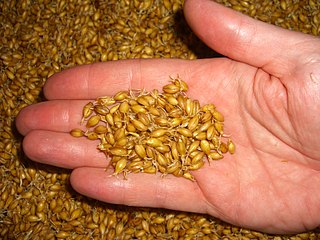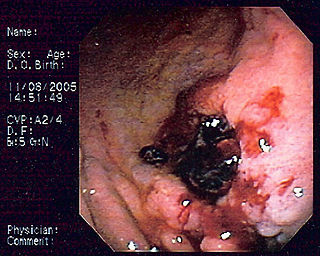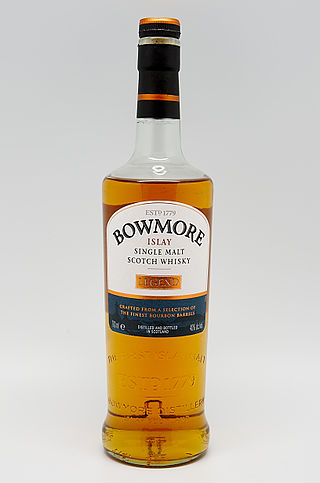Dose or Dosage may refer to:

Malt is any cereal grain that has been made to germinate by soaking in water and then stopped from germinating further by drying with hot air, a process known as "malting". Malted grain is used to make beer, whisky, malted milk, malt vinegar, confections such as Maltesers and Whoppers, flavored drinks such as Horlicks, Ovaltine, and Milo, and some baked goods, such as malt loaf, bagels, and Rich Tea biscuits. Malted grain that has been ground into a coarse meal is known as "sweet meal".

Scotch whisky, often simply called whisky or Scotch, is malt whisky or grain whisky made in Scotland.

Whisky or whiskey (IPA: /wɪskiː/ is a type of liquor made from fermented grain mash. Various grains are used for different varieties, including barley, corn, rye, and wheat. Whisky is typically aged in wooden casks, which are typically made of charred white oak. Uncharred white oak casks previously used for the aging of port, rum or sherry are also sometimes used.

Single malt whisky is malt whisky from a single distillery.
In general, a filler is something that is used to fill gaps. Specialized meanings include:

Grain whisky normally refers to any whisky made, at least in part, from grains other than malted barley. Frequently used grains include maize, wheat, and rye. Grain whiskies usually contain some malted barley to provide enzymes needed for mashing and are required to include it if they are produced in Ireland or Scotland. Whisky made only from malted barley is generally called "malt whisky" rather than grain whisky. Most American and Canadian whiskies are grain whiskies.

Myeloid tissue, in the bone marrow sense of the word myeloid, is tissue of bone marrow, of bone marrow cell lineage, or resembling bone marrow, and myelogenous tissue is any tissue of, or arising from, bone marrow; in these senses the terms are usually used synonymously, as for example with chronic myeloid/myelogenous leukemia.
The mucosa-associated lymphoid tissue (MALT), also called mucosa-associated lymphatic tissue, is a diffuse system of small concentrations of lymphoid tissue found in various submucosal membrane sites of the body, such as the gastrointestinal tract, nasopharynx, thyroid, breast, lung, salivary glands, eye, and skin. MALT is populated by lymphocytes such as T cells and B cells, as well as plasma cells, dendritic cells and macrophages, each of which is well situated to encounter antigens passing through the mucosal epithelium. The appendix, long misunderstood as a vestigial organ, is now recognized as a key MALT structure, playing an essential role in B-lymphocyte-mediated immune responses, hosting extrathymically derived T-lymphocytes, regulating pathogens through its lymphatic vessels, and potentially producing early defenses against diseases. In the case of intestinal MALT, M cells are also present, which sample antigen from the lumen and deliver it to the lymphoid tissue. MALT constitute about 50% of the lymphoid tissue in human body. Immune responses that occur at mucous membranes are studied by mucosal immunology.

MALT lymphoma is a form of lymphoma involving the mucosa-associated lymphoid tissue (MALT), frequently of the stomach, but virtually any mucosal site can be affected. It is a cancer originating from B cells in the marginal zone of the MALT.

Malt whisky is whisky made from a fermented mash consisting of malted barley. If the product is made exclusively at a single distillery, it is typically called a single malt whisky. Although malt whisky can be made using other malted grains besides barley, those types are not called malt whisky without specifying the grain, such as rye malt whisky or buckwheat malt whisky.

The tonsils are a set of lymphoid organs facing into the aerodigestive tract, which is known as Waldeyer's tonsillar ring and consists of the adenoid tonsil, two tubal tonsils, two palatine tonsils, and the lingual tonsils. These organs play an important role in the immune system.
Wort is the liquid extracted from the mashing process during the brewing of beer or whisky. Wort contains the sugars, the most important being maltose and maltotriose, that will be fermented by the brewing yeast to produce alcohol. Wort also contains crucial amino acids to provide nitrogen to the yeast as well as more complex proteins contributing to beer head retention and flavour.
A blend is a mixture of two or more different things or substances; e.g., a product of a mixer or blender.

Marginal zone lymphomas, also known as marginal zone B-cell lymphomas (MZLs), are a heterogeneous group of lymphomas that derive from the malignant transformation of marginal zone B-cells. Marginal zone B cells are innate lymphoid cells that normally function by rapidly mounting IgM antibody immune responses to antigens such as those presented by infectious agents and damaged tissues. They are lymphocytes of the B-cell line that originate and mature in secondary lymphoid follicles and then move to the marginal zones of mucosa-associated lymphoid tissue (MALT), the spleen, or lymph nodes. Mucosa-associated lymphoid tissue is a diffuse system of small concentrations of lymphoid tissue found in various submucosal membrane sites of the body such as the gastrointestinal tract, mouth, nasal cavity, pharynx, thyroid gland, breast, lung, salivary glands, eye, skin and the human spleen.
Straight whiskey, as defined in United States law, is whiskey that is distilled from a fermented cereal grain mash to a concentration not exceeding 80% alcohol by volume (abv) and aged in new charred oak barrels for at least two years at a concentration not exceeding 62.5% at the start of the aging process. Domestic sales of straight whiskey surpassed 27 million 9-liter cases in 2021.
A malt drink is a fermented drink in which the primary ingredient is the grain or seed of the barley plant, which has been allowed to sprout slightly in a traditional way called "malting" before it is processed.








